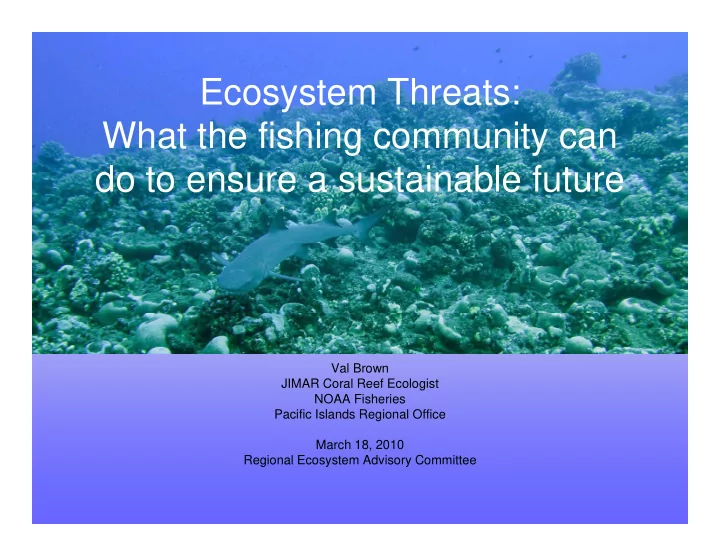

Ecosystem Threats: Ecosystem Threats: What the fishing community can do to ensure a sustainable future do to ensure a sustainable future Val Brown JIMAR Coral Reef Ecologist JIMAR Coral Reef Ecologist NOAA Fisheries Pacific Islands Regional Office March 18, 2010 Regional Ecosystem Advisory Committee
Overview Overview • Reef Ecosystem Interactions 101 Reef Ecosystem Interactions 101 • Ecosystem Threats • Resilient Reefs R ili t R f • Paths to Resiliency
Simplified View of a Reef Simplified View of a Reef Fish, , Invertebrates, Turtles, etc. Slow Growing Fast Growing Corals Algae Competition for Space Competition for Space •Structure •Food •Protection •Protection •Structure St t •Food •Protection
Corals and Algae in a Reef Without H Herbivores…. bi Fish, , Invertebrates, Turtles, etc. Slow Growing Fast Growing Corals Algae Competition for Space Competition for Space Photos: Hughes et al 2007
G. Davis
Important Interactions Important Interactions • Corals and algae g compete for space • Herbivores are essential to maintain i l i i the equilibrium between algae and between algae and corals • Intact fish communities are necessary for healthy reefs
Human Activities Alter this Balance Fish, Recreational - - - Fishing Invertebrates, Impacts p Turtles, etc. - +/- +/ - Corals Algae - - + Lack of Public Climate Awareness Change Pollution
Climate Change Climate Change • What does this mean for Guam’s reefs? What does this mean for Guam s reefs? – Warmer waters Increased coral bleaching, shifts in species distribution shifts in species distribution – Ocean acidification May impact coral growth rates as well as other organisms that growth rates as well as other organisms that calcify, including invertebrates – Increased sea levels – ???
Coral Bleaching on Guam Coral Bleaching on Guam • Two events over the last 5 years – Corals and other organisms with g zooxanthellae down to 5m were observed to bleach • Including fire corals, giant clams, and anemones l d • In the 200x event we saw mortality in recently bleached corals rapidly p y covered in algae • In the 200x event we noticed an increase in coral disease associated with the event associated with the event
Ocean Acidification Ocean Acidification • Carbon Dioxide is absorbed by the ocean Carbon Dioxide is absorbed by the ocean • As atmospheric CO2 increases, the amount absorbed by the ocean increases amount absorbed by the ocean increases
Fishing Fishing • Fishing has a direct effect on reef Fishing has a direct effect on reef ecosystems • Fish are a renewable resource IF we • Fish are a renewable resource IF we harvest them in a sustainable manner • We need to consider our fishing practices W d t id fi hi ti in the context of these broader ecosystem th threats t
Reef Resilience Reef Resilience • Preserve the Balance Preserve the Balance – Ensure that all parts of the ecosystem are in place place • Herbivorous fish and invertebrates • Apex predators p p • Reduce Impacts p • Pollution • Recreational Impacts Guam Dept. of Agriculture
How do we Balance? How do we Balance? • The role of Marine Protected Areas The role of Marine Protected Areas – Improved resilience – stabilizes coral cover • Enhance Herbivory Enhance Herbivory – Reduce take of herbivores in heavily impacted areas – this may be very important for reef y y p restoration • Enhance Reproductive Capacity in Stocks – Choose to harvest fish after they’ve become reproductively mature
Poster concept, design and art by DRAFT POSTER Ellyn Tong
Key Points Key Points • There are big threats to our reefs on the horizon g • Herbivores are essential to maintain the equilibrium between algae and corals • Apex predators play an important role in keeping • Apex predators play an important role in keeping our fish stocks healthy and robust • Fishers can help improve resiliency by making p p y y g choices about their target fish • Enhance herbivory in restoration areas to help restore the balance restore the balance • Increase reproduction by targeting fish above the L50 and also leaving the really big fish
Questions? Si Yu’os Ma’ase! Si Yu os Ma ase!
Recommend
More recommend